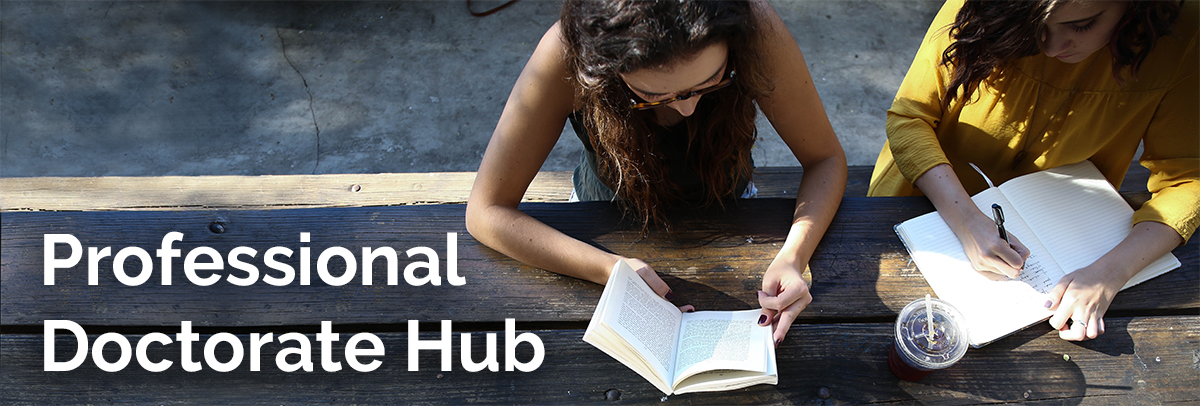The comments from other PD students might give you insight into how they approached these areas. As you read the sections make a note of any actions and add them to your Researching Professional Development Plan. You can then discuss your action plan with your supervisor and revisit it at the end of the PD year.
The literature review
What others said:
One of my biggest questions was how do I decide what is important and what is not? … I had a bit of a propensity to read something and ‘Oh gosh that is really, that is quite cool, if you paint the walls green the plants grow better. Right, I think I will do some more reading on that because that sounds quite good’ and so I was relatively easily distracted so I learned to pull that in.
One of the things I didn’t realise that I was doing until far too late was that if I was reading something and I thought ‘that doesn’t fit, that doesn’t make sense’ … I put that on one side, as opposed to understanding it was also part of the literature. In my head I was going in a straight line.
Do not have as your first aim to find lots of articles … take the time to learn how to search.
I have set up Google Scholar to be connected to the library which I find ever so handy because Google Scholar I often find more convenient to search for things within, and then just a little click of a button and I am back in the OU library.
Points for you to consider:
- How good are your literature search skills?
- Have you set up online alerts to help you keep up to date with new literature in your area?
- Can you be distracted by literature? What could you do about this?
- Do you tend to discard literature too readily? What could you do about this?
Please note that there are a range of resources on the OU Library Training site.
Collecting and managing references
What others said:
I saved all refs in a file as I went on. I … found that the best way for me was to go into Google Scholar and to press cite, grab the APA version which needed less modifications, and to save it in alphabetical order.
I think I would have tried to find a good referencing tool early, but I think I would need to have it explained to me why it is good.
Points for you to consider:
- How well do you think you are managing your references?
- Does your system work for you, or do you need to amend it?
Ethical considerations
What others said:
I made it far more complicated than it was because I should have just got on and done it but then in the end I had to put off my data collection the first time I organised it because I hadn’t got approval so ...it sounds silly but I should have just done it [earlier].
Points for you to consider:
- Are you aware of all the bodies from which you will need ethical approval and how long each process will take? (See The Open University’s Human Research Ethics Committee website for help.)
- Have you made diary notes of when you need to start applying for approval?
Developing as a researcher
What others said:
As a teacher I am used to organising how students work and that is what I expected. However … the [EdD] approach was tending to be a reaction [from my supervisors] to what I wrote rather than [them] organising me … it is a different way of looking at how to develop your thinking.
Any movement towards thinking as a researcher I found quite difficult because I find myself trying to say ‘Why can’t I say this? Why can’t I do that? Why does something have to be externally referenced when I have seen it?’ I found it quite hard to get on to what I suppose would be identified as a deeper level of thinking.
I took a strategy skill that [a very well known writer] had, and then I thought ‘no, I am not going to take what you have, I went and asked students to jot down for me what they believed motivated them and collected accounts from some 200 or so students. I got colleagues to also give me their opinion then cross-checked what [the writer] was suggesting with what seemed relevant in my population and then sort of added and subtracted based on that so that I could try and come up with something that was perhaps more appropriate for my area.
Points for you to consider:
- How much do you feel you have taken ownership of your research?
- What more could you do to develop your own independent voice as a researcher?
Gathering and analysing data
What others said:
I had to learn SPSS …I got a really good text book and somebody had written a thesis as well doing something similar to what I had done with the same SPSS sequence of calculations so that was a very good guide.
My supervisors wanted transcripts of the interviews which first of all seemed a bit laborious but having used one transcript I can see what they are getting at because it raised issues that weren’t included in the questions but also issues that were significant to the research.
I massively underestimated the work involved in transcribing conversation inside a class room. … What I should have done actually is got the basic transcription done by a transcription service and then reviewed the transcription whereas actually I did it all myself … [You can] crowd source transcription and it is fast and it is cheap and it would have saved me a great deal of heartache.
Points for you to consider:
- What techniques will you need to develop further in the next year?
- Have you considered how long your data analysis might take and whether your proposed approach is feasible?
Academic writing
What others said:
One of the things about [having been] a journalist is that you have just got to write. … I just get started and [know] it will be fine, it will take shape.
Structuring [my writing was a problem] – sometimes things make sense to me but they don’t make sense to other people … I don’t know why I struggled with it but putting things in the right order was a bit of an issue earlier on in the year.
[Engaging with academic culture was] problematic. Problematic because I am not systematic, problematic again because again I think I have been used to, for example, writing in particular ways for a long time and the way of expressing the process in doing the EdD is quite different or subtly different from the ways that I have been required to write beforehand.
At the moment [writing up my thesis] you add something and then you think ‘oh my goodness, quickly check the word count see how far out we are going, OK I need to find some more to shave off before I add anymore’. That is my approach at the moment.
You may want to re-structure your thesis once you start putting all the chapters together towards the end of the third year. I moved one chapter three times before settling. You are telling a story and it is important that the work flows.
Points for you to consider:
- How good are you at getting started on a piece of writing?
- What aspects of your writing style would you hope to develop further in the next year? How might you action this?
- How much do you plan the structure, content, length, etc. before you start writing?
- How well do you cope with the fact that writing is an iterative process? Do you need to work on this?
Developing effective study skills
What others said:
In terms of the studying, be very disciplined and methodical from day one. For instance taking notes about everything you read and keeping the references in a safe place.
There were three of us who began the EdD together … we have noticed … that if you are organised and set yourself time frames and actually try to stick within the timeframes then it is an enormous help. … I always kid myself that [a report] has got to be in three days before it has or four days before it has just in case. I am a little bit obsessed with time.
My job is quite busy, I probably work 70 hours a week, something like that which is not at all unusual. So fitting this in has been considerable and so I needed to be really structured and I needed to be extremely aware of what I was going to sacrifice and for how long I was going to sacrifice it, so I think organisation is the key and I think being very realistic about what you can and can’t do is very important.
[The issue] is the time factor and it doesn’t matter how organised you are, you still end up staying up all night and getting up at 5 o’clock in the morning on a regular basis and sitting inside while everybody has gone out, and all those things … you have got to be dedicated to do what you want to do and to get to the end of the course.
I think my first plan was going to [be to] study everything under all conditions and I was probably going to spend a lifetime doing it and [my supervisor] very early on said ‘now look, don’t be silly. Let’s cut this down to something that can actually be done in the space of three years rather than an entire lifetime’.
Points for you to consider:
- How do you make sure you have enough time for your PD studies?
- How good are you at prioritising, planning and sticking to the plan?
- What do you do to ensure any study time is spent as effectively as possible?
- Which parts of your PD studies are most likely to cause problems in the next year? What might you do to avoid, or workaround, those problems?
This section has been about ‘developing research and study skills’. Before moving on, have a final look at the actions you have added to your Researching Professional Development Plan as a result of working through this section. Will your planned actions help you move forward over the coming year? Will they help you in your work as a researcher? Are there any other actions that you feel might help you?
Return to the Researching Professional Development Framework.

This piece of content is part of the 'Professional Doctorate Hub', a collection of academic-led info, from articles and infographics to animations. Click on the banner above or CLICK HERE to view all materials.
Explore Postgraduate Qualifications at The OU:
-
Professional Doctorates (EdD/DHSC)
Learn more to access more details of Professional Doctorates (EdD/DHSC)
-
Professional Doctorate in Health and Social Care (DHSC)
Learn more to access more details of Professional Doctorate in Health and Social Care (DHSC)
-

Learn more about studying at Postgraduate level:
-
Succeeding in postgraduate study
Learn more to access more details of Succeeding in postgraduate studyThis course will help you to become familiar with the requirements and demands of postgraduate study and to develop the skills and confidence to pursue your learning further.

Rate and Review
Rate this article
Review this article
Log into OpenLearn to leave reviews and join in the conversation.
Article reviews